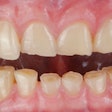
Cognitive-behavioral therapy (CBT) may effectively improve pain and quality of life in patients with temporomandibular disorders (TMDs), according to a systematic review published in the Journal of Oral Rehabilitation.
Patients experienced significant pain reduction, improved jaw function, and better psychological well-being when receiving CBT alone, combined with conventional treatments, or paired with hypnotic therapy, the authors wrote.
"This systematic review highlights the potential benefits of CBT in managing TMDs, suggesting its effectiveness in improving pain outcomes and enhancing overall well-being," wrote the authors, led by Sahana Shivakumar of the Peoples University College of Dental Sciences and Research Centre in India (J Oral Rehabil, July 23, 2024).
CBT helps individuals identify and challenge negative thought patterns related to stress, promoting more realistic and positive thinking to lessen its emotional impact. Since stress is a common trigger for TMD symptoms, CBT aids in recognizing stressors and developing effective stress management strategies, the research team wrote.
A comprehensive search across multiple databases using medical subject headings (MeSH) keywords and Boolean operators identified clinical trials comparing CBT, alone or with standard treatments, to control groups in TMD patients. The primary outcome measured was pain, with secondary outcomes including disability, depression, and jaw function.
Of the clinical studies reviewed, eight met the inclusion criteria, with sample sizes ranging from 21 to 148 participants and mean ages from 25.7 to 39.4 years. Seven of these studies showed significant improvements in TMD-related outcomes, including reduced pain, enhanced jaw function, better quality of life, and improved psychological well-being with CBT, either alone or combined with conventional treatments or hypnotic therapy, they wrote.
However, the study's short follow-up periods limit the understanding of the long-term effectiveness and sustainability of the interventions. Given that TMD is a chronic condition, extended treatment and monitoring would offer better insights into the durability of the observed improvements, they wrote.
"The observed reductions in pain scores, improved jaw function, and enhanced mental well-being in response to these interventions offer potential treatment strategies for healthcare professionals, including dentists, orofacial pain specialists and therapists specialising in TMD," Shivakumar et al concluded.




















